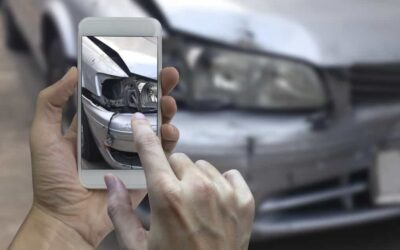The Top 5 Reasons Why You Should Not Answer Calls from Insurance Adjusters When You’ve Been Injured
One question we hear a lot from our clients, family members, and friends is whether they should answer the phone when the insurance company for the other driver calls them after a car wreck. We always advise clients not to talk to the other driver’s insurance company when they call.
Our Personal Injury Case Manager, Ryan Bradley, is a former insurance adjuster who used to make those phone calls to injured parties on behalf of the other driver’s insurance company. We sat down with Ryan this week and had him explain the behind-the-scenes perspective of what is going through an insurance adjuster’s mind when he or she is on the phone with someone who has recently been injured in a car wreck.
Q. Give us an example of the type of claim you handled as a former insurance adjuster.
A. Let’s say I worked for the Acme Insurance Company. For this example, we’ll assume that the Acme Insurance Company sold an insurance policy to Bob, which makes Bob our insured. Now, let’s say that Bob was driving his truck while he was texting his girlfriend. As a result, Bob slammed into the rear of Susan’s car without ever stepping on the brakes. Susan was severely injured by the impact and was taken to the hospital by an ambulance.
Q. Once you received notice of the claim made on Bob’s insurance policy, what was your job as an adjuster for a company like Acme?
A. My job, as a former insurance adjuster for a company like Acme, was to protect Bob and to protect Acme. As part of that job, I would try to call Susan as soon as possible after the wreck (within a couple of days of the wreck if she would answer). I would then try to convince her to accept a low-ball settlement from Acme on my very first call with her. When this was successful (meaning Susan accepted my settlement the first time I called her), the insurance company would refer to this as a “first contact settlement,” which was like scoring a touchdown for the insurance company. As an adjuster, my goal was to try to settle the claim with Susan before she was able to hire her own attorney.
Q. Did you take into account how much Susan would end up owing in medical bills when you made the first contact settlement offer to her?
A. Not really. If I could convince Susan to settle for $500, I would do it. It didn’t matter to Acme that Susan’s ambulance ride to the hospital alone would cost more than $500, let alone the thousands of dollars in hospital and doctor’s bills she would rack up. My job was to try to get our insured off the hook and to save the insurance company as much money as I could.
Q. How would you get someone like Susan to accept the settlement?
A. I would try to get Susan to sign a release or, better yet, have her agree to a recorded release, where I would record her agreeing to accept the $500 settlement from my insurance company for her injuries.
Q. Why did the insurance company want Susan to sign a release or give a recorded release on the phone call?
A. Because if I could get Susan to agree to release Bob for $500, then neither Bob nor Acme would be responsible for any of Susan’s injuries beyond that $500 settlement.
We agree with Ryan that even if you don’t agree to a settlement from an insurance company, talking to the other driver’s insurance adjuster shortly after a wreck is not beneficial to you.
HERE ARE RYAN’S TOP 5 REASONS YOU SHOULD NOT ANSWER CALLS FROM INSURANCE ADJUSTERS WHEN YOU’VE BEEN INJURED:
- The Adjuster is looking for a way to deny liability. This means the adjuster is trying to find a way to keep his insurance company from having to pay you for your injuries altogether. If I was the one calling you, I would try to find holes in your story so that I could try to find a reason to deny liability. If, for example, I could get you to say something that would make it seem like the wreck was your fault, or at least partially your fault, then my insurance company might not have to pay you as much (or they might not have to pay you anything at all).
- Everything you say will be used against you. When speaking to an insurance adjuster, you should assume that the call is being recorded, meaning that whatever you say can more easily be used against you. Adjusters are also taking file notes the entire time you are talking, so they document every conversation. Even if you trip up and say something incorrectly on the call, you cannot easily go back and say, “I didn’t say that,” because they have you recorded saying it.
- The Adjuster is going to ask about your injuries in detail. So, guess what? If you tell me on Monday right after your car wreck that you only had neck pain, but the next time I talk to you and you claim that you also broke a rib in the wreck, I am going to argue that your rib injury is not related to the wreck or you would have told me about that when I first talked to you. Adjusters know that the quicker they can get in touch with you, the more likely they are to be able to argue that your injuries from the wreck were limited to the injuries you described immediately after the wreck (versus what the doctors find when they examine you).
- Adjusters are good with their words. Adjusters know a lot about insurance terminology, medical terminology, and legal terminology. The adjuster might say things to you that you do not understand and try to pressure you into saying something you might not have understood you were saying.
- Last, but not least, (as explained in more detail above), the Adjuster might attempt to get you to accept a “first contact settlement.” An adjuster is going to throw a small amount of money at you and you might start to think about your next bill due or maybe it is around the holidays and your kids need gifts. A settlement of $500 would be nothing to the insurance company, so they’ll throw that money at you to make you go away. Don’t think about the immediate payout, think about how your injuries might affect you long term when agreeing to settle a claim.




